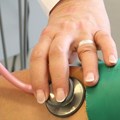AstraZeneca has set out a new ambition for Healthy Heart Africa, its flagship health equity initiative, to target a broader range of non-communicable diseases (NCDs), including chronic kidney disease (CKD) as well as hypertension and cardiovascular disease.

Source: Supplied. The Ministry of Health of Ghana signing an MoU with AstraZeneca. Franklin Asiedu Bekoe, director public health, Ghana Health Service; Winfred Ofosu, Ghana Health Service; Deepak Arora, country president, African Cluster, AstraZeneca, and Ruud Dobber, executive vice president, BioPharmaceuticals Business Unit, AstraZeneca.
The expanded programme will also launch in Egypt, reaching even more patients across the continent.
At the 77th World Health Assembly (WHA) during an event co-hosted with the Ministry of Health for Uganda, AstraZeneca announced that the expanded Healthy Heart Africa programme will be operational in Côte d'Ivoire, Egypt, Ethiopia, Ghana, Kenya, Nigeria, Rwanda, Senegal and Uganda by the end of 2025.
Launched in 2014, Healthy Heart Africa was established to address the increasing burden of cardiovascular diseases in Africa.
The programme aims to improve health outcomes, with a focus on increasing awareness of the symptoms and risks of hypertension; providing health education and access to early screening and treatment; and delivering training to healthcare providers.
This supports health system resilience by relieving the social and economic burden arising from late-stage treatment and care of cardiovascular and related diseases.
Programme exceeds health goals
Over the past decade, the programme has conducted more than 54 million blood-pressure screenings and trained more than 11,400 healthcare workers. By March 2024, the programme achieved its initial ambition to reach 10 million people with elevated blood pressure, nearly two years ahead of target.
Jean Ruth Aceng Ocero, minister of health for The Republic of Uganda, said: "As we confront the burden of non-communicable diseases in Uganda, which account for 36% of deaths and 81,300 annual mortalities, it is imperative to strengthen our health systems.
"With a 21% probability of premature mortality from NCDs, resilient health systems are crucial for early detection and effective management."
Jean Kaseya, director-general of the Africa Centres for Disease Control, said: “The rising burden of non-communicable diseases (NCDs) in Africa, which have increased from 24% in 2000 to 37% in 2019 of all deaths, highlights the urgent need for comprehensive and co-ordinated action.
Supporting member states to integrate NCD prevention and control into primary healthcare and strengthen multi-sectoral co-ordination on NCDs are among the priority interventions for the African CDC.”
Public, private sectors unite
Ruud Dobber, executive vice president of BioPharmaceuticals Business Unit, AstraZeneca, said: “The public and private sectors must work hand in hand to address the escalating burden of NCDs and ensure more equitable and sustainable health outcomes for patients across Africa and beyond.
"Heart and kidney health are often interconnected, and with earlier diagnosis, intervention and treatment of cardiorenal diseases, we have a tremendous opportunity to prevent life-threatening complications, and reduce the economic and environmental impact of disease across the continent.”
Khaled Abdel Ghaffar, minister of health and population for Egypt, said: “With the links between climate change and noncommunicable diseases like heart and kidney disease, it is becoming increasingly clear that we must act urgently to adapt our health systems to deal with this reality.
"Egypt is proud to be joining the Healthy Heart Africa programme as part of our steadfast commitment to improving the health and wellbeing of all Egyptians.
"Through the signed Letter of Intent, we will be able to improve CKD public awareness, enhance early screening and diagnosis, support training for our HCPs, digitalise CKD healthcare management and update our local management protocols in line with the latest global standards.”
Global leaders unite against NCDs
At the event, global leaders in NCD care, including ministers of health for Uganda, Ethiopia and Egypt, as well as high-level representatives from the Africa CDC, the World Health Organization, PATH, Amref and patient advocacy groups, committed to tackle the growing burden of NCDs in Africa, emphasising the importance of early detection, evidence-based treatments, and the effective implementation of public-private partnerships such as Healthy Heart Africa.
AstraZeneca reinforced its focus on taking a public-private partnership approach to deliver Healthy Heart Africa’s goals by signing memorandums of understanding with the ministries of health from Egypt, Uganda, and Ghana.
The programme supports Sustainable Development Goal (SDG) 3.4 to reduce by one third premature mortality from NCDs through prevention and treatment by 2030.



























![Today, Halo and Demographica announce a new specialist agency, Second Rodeo]], headed up by Mike Stopforth (left). Dean Oelschig, managing partner and founder of Halo (right) says they will work as a group but ultimately, each agency will be an individual specialist](https://biz-file.com/c/2505/772543-64x64.jpg?2)




